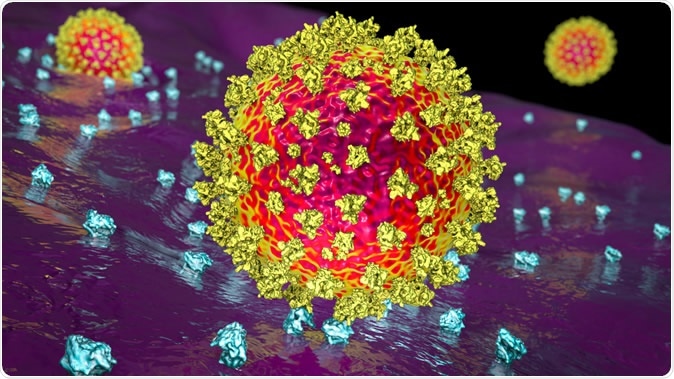Emerging concerns that common antihypertensive treatment approaches with angiotensin-converting enzyme inhibitors (ACEIs) and angiotensin receptor blockers (ARBs) – jointly known as renin-angiotensin-aldosterone system (RAAS) inhibitors – may exert a negative effect in COVID-19 patients are not grounded in scientific evidence, as reported by researchers in a recent review article published in Mayo Clinic Proceedings journal.
Interplay between the virus, receptors, and drugs
It is known that angiotensin-converting enzyme 2 (ACE2) acts as a homolog of ACE and a functional receptor for coronaviruses – including SARS-CoV-2. Although found in many organ systems throughout the human body, it is densely distributed in the lungs and on lymphocytes; hence, contributing to the prevalent lung involvement in COVID-19 (primary interstitial pneumonia, acute respiratory distress syndrome, or ARDS, and lymphopenia).

SARS-CoV-2 virus binding to ACE2 receptors on a human cell, the initial stage of COVID-19 infection, scientifically accurate 3D Illustration Credit: Kateryna Kon / Shutterstock
Since the aforementioned enzyme converts angiotensin I to angiotensin II, and both ACEIs and ARBs are implicated in this pathway, many health care professionals were worried that these drugs might, in turn, increase susceptibility to the virus and, potentially, the severity of the disease.
However, several notable health organizations have swiftly published position papers stating that there is no appropriate evidence that would endorse changing the use of ACEIs or ARBs for managing elevated blood pressure in the context of COVID-19 treatment or avoidance
Continue without interruption – even with COVID-19
Along those lines, the recent article in Mayo Clinic Proceedings, authored by Dr. Fabian Sanchis-Gomar and his colleagues from the front lines of battling the infection in Italy, Spain and the United States, parses the evidence on the relationship between RAAS inhibitors and COVID-19 infection – and gives several important take-aways in the attempt to disentangle this controversy.
"In agreement with current guidelines, we recommend patients with hypertension should continue taking antihypertensive medications without interruption", says lead and corresponding author of the study Dr. Fabian Sanchis-Gomar from the University of Valencia Faculty of Medicine, INCLIVA Biomedical Research Institute in Valencia, and Stanford University School of Medicine in the United States.
As explained in the article, all the current evidence points to the conclusion that RAAS inhibitors substantially reduce mortality rates in cardiovascular disease and are actually fundamental for dealing not only with hypertension but also heart failure. Therefore, treatment with ACEIs or ARBs should be initiated or maintained in patients, regardless of COVID-19 status.
Moreover, because both ACEIs and ARBs are also given to slow down the progression of chronic kidney disease, study authors suggest that these recommendations can be extended to the use of the aforementioned agents in chronic kidney disease as well.
The early state of evidence
Even though no studies included in this review have demonstrated an increase in circulating levels or expression of ACE2, the authors of this review note that more research and evidence are necessary to elucidate the purported role of RAAS inhibitors for the treatment or disease prevention.
Dr. Carl J. Lavie, the study co-author from the John Ochsner Heart and Vascular Institute, Ochsner Clinical School of the University of Queensland School of Medicine in New Orleans (United States), further explains: "Angiotensin II is known to foster inflammation, oxygenation, vasoconstriction, and fibrosis, so it is quite conceivable that a pharmaceutical agent that can inhibit the production of this hormone could actually be very beneficial for preventing lung injury and also for systemic health. Certainly, it is premature right now to start these agents as a preventive measure for COVID-19 in patients with no other indicator for RAAS inhibitors. However, this is an active area for investigation."
"Given the equal efficacy but fewer adverse events, ARBs could potentially be a more favorable treatment option in COVID-19 patients at higher risk of developing severe forms of disease", the authors conclude in the study.
In any case, ongoing evaluation of the influence of ACEIs and ARBs on the course of COVID-19 will necessitate the analysis of larger data sets, linking their use with the acute lung injury/ARDS, as well as survival and mortality rates in patients with hypertension, diabetes, and cardiovascular diseases.
Journal reference:
Sanchis-Gomar, F. et al. (2020) Angiotensin-Converting Enzyme 2 and Anti-Hypertensives (Angiotensin Receptor Blockers and Angiotensin-Converting Enzyme Inhibitors) in Coronavirus Disease 2019 (COVID-19). Mayo Clinic Proceedings, Volume 95, Issue 6 (June 2020). doi.org/10.1016/j.mayocp.2020.03.026